Future Events
-
-
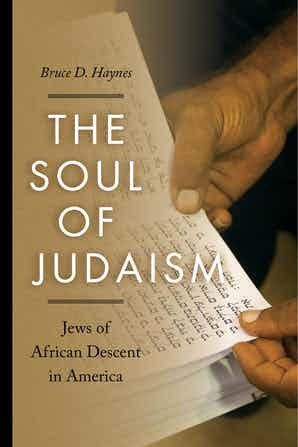
“The Soul of Judaism: Jews of African Descent in America”
– A Conversation with Dr. Bruce D. HaynesJoin University of California, Davis Professor Bruce D. Haynes for a look into the diverse origins of Jews of African descent in the United States. Dr. Haynes’s most recent book explores the full diversity of Black Jews, including bi-racial Jews of both matrilineal and patrilineal descent; adoptees; black converts to Judaism; and Black Hebrews and Israelites, who trace their Jewish roots to Africa. In doing so, he challenges the dominant western paradigm of Jews as white and of European descent, and offers insights into how Black Jewish individuals strive to assert their dual identities and find acceptance within their respective communities.
-
-
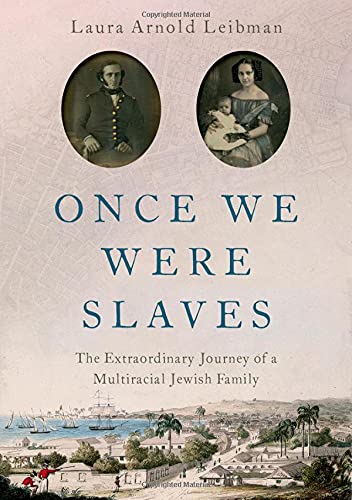
“Once We Were Slaves: The Extraordinary Journey of a Multiracial Jewish Family” – A Conversation with Dr. Laura Arnold Leibman
Join Dr. Laura Arnold Leibman (Reed College) to discuss her most recent book, "Once We Were Slaves: The Extraordinary Journey of a Multiracial Jewish Family.” Dr. Leibman follows Blanche Moses, a descendant of one of the most prominent Jewish families since the American Revolution, as she researches her family history. During the course of her investigation, Moses discovers her grandmother and great-uncle were not always the wealthy, free, white Sephardic Jews she believed, but were born as poor Christian slaves in Barbados. "Once We Were Slaves" brings to life the largely forgotten population of mixed African and Jewish ancestry and illuminates the fluidity of race, as well as the role of religion in determining racial identities in early nineteenth-century America.
-
-
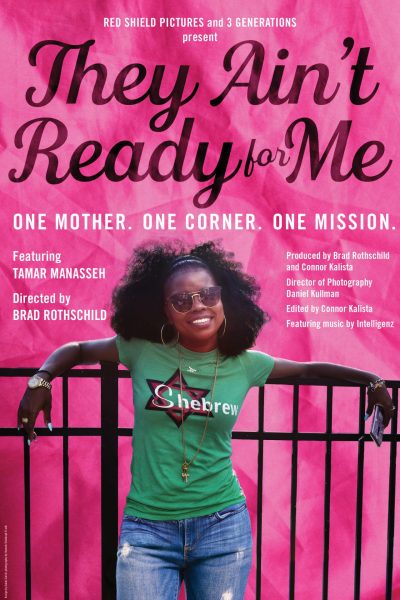
“They Ain’t Ready for Me”: A Conversation with Rabbi Tamar Manasseh and Filmmaker Brad Rothschild
In the midst of renewed attention to gun violence in America, Rabbi Tamar Manasseh and filmmaker Brad Rothschild discuss their moving documentary “They Ain’t Ready for Me.” This film tells the story of Rabbi Manasseh's fight against senseless killings on the South Side of Chicago. For years, she has sat on a street corner barbecuing, playing music and bringing games for kids to play with. Manasseh and the organization she founded, Mothers and Men Against Senseless Killings (MASK) are proving that something can be done and that the situation is not hopeless. With just her presence on the block, she is making forgotten members of the neighborhood believe that there are people who care whether they live or die.
Manasseh's unique background and upbringing give her a perspective that few people can claim. Both “authentically Jewish and authentically Black”, she brings an understanding of both communities, even as she struggles for acceptance in the Jewish world. Join us for a conversation with Manasseh and Rothschild about the challenges and motivations of this fearless community leader as she works to prevent more people from being killed by gun violence.
See the trailer here.
-
-
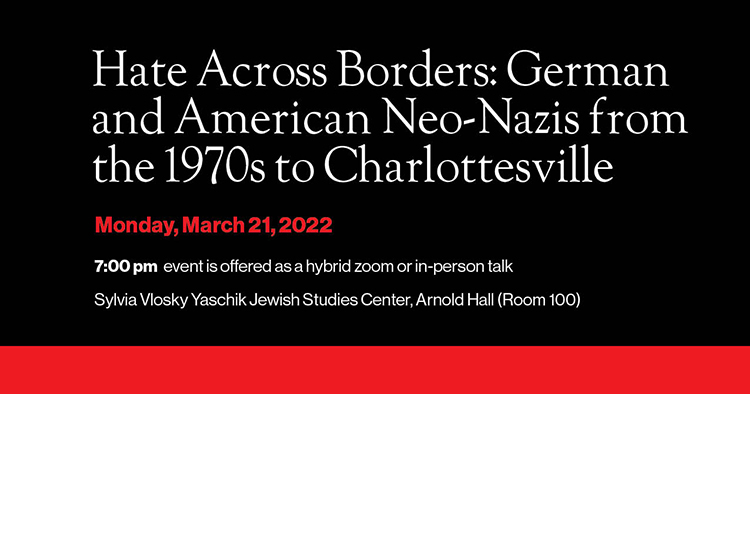
Hate Across Borders: German and American Neo-Nazis from the 1970s to Charlottesville
Arnold Hall 96 Wentworth Street, Charleston, SC, United StatesThe in-person event will take place in the Jewish Studies Center, Arnold Hall (Room 100) and via Zoom. Registration Link
-
-
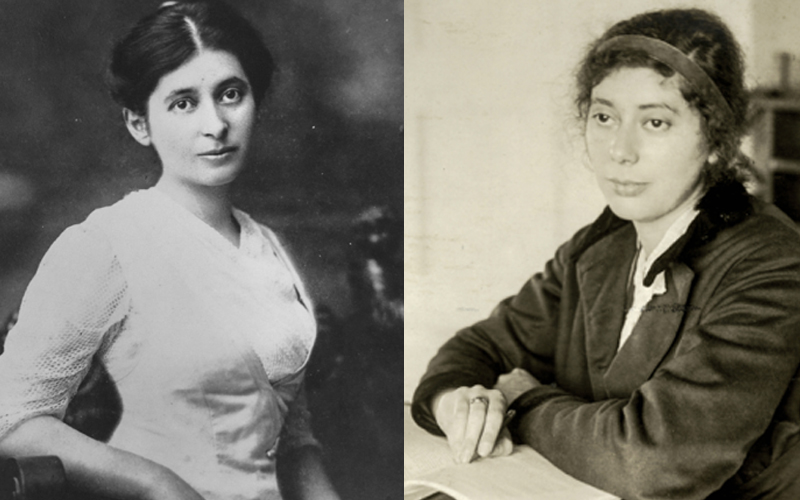
Sunday Brunch: “‘Love Letters of a Socialist: Jack London, Sinclair Lewis, and the Strunsky Sisters”
Arnold Hall 96 Wentworth Street, Charleston, SC, United StatesCofC professor Ashley Walters will talk about her current book project over brunch. She will tell a story of revolution and romance between two East European-born Jewish sisters named Anna and Rose Strunsky—young and captivating writers dedicated to the socialist revolution—and an impressive cast of well-known American authors, including Jack London, William English Walling, Arthur Bullard, and Sinclair Lewis.
-
-
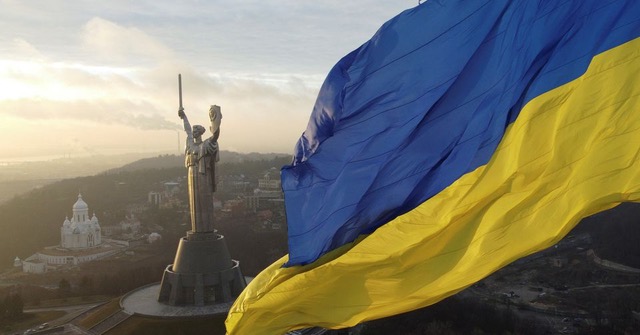
Russia’s War in Ukraine: A Conversation with Dr. Amber Nickell
Please join Professors Chad Gibbs and Ashley Walters for a discussion on Russia’s war in Ukraine with Dr. Amber Nickell of Fort Hays State University.
-
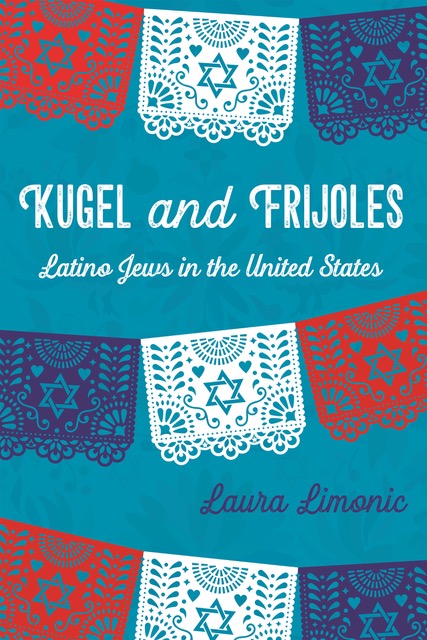
Sunday Brunch: Bienvenidos a Miami: How Latinx Jews Remake the Jewish Mainstream
Arnold Hall 96 Wentworth Street, Charleston, SC, United StatesAlmost three quarters (72%) of the population in Miami-Dade county is of Latinx/Hispanic origin. Spanish of various accents can be heard in supermarkets, schools and synagogues. Latin American immigrants from Cuba, Mexico, Puerto Rico down to the Southern Cone have been fleeing social and economic upheaval for decades. Miami, with its close proximity to Latin America, widely spoken Spanish and commercial and job opportunities is an obvious destination for both Jewish and non-Jewish Latin American/Latinx immigrants. Miami has the largest influx of Jewish immigrants from Latin America, immigrants who have entered the community at a pivotal point when existing congregations, schools and Jewish community centers have been losing members. In this talk, Limonic will discuss how Latin American Jews, with their strong commitment to communal ties and institutions, have invigorated existing communities while forging new identities as panethnic Latinx Jews.
-
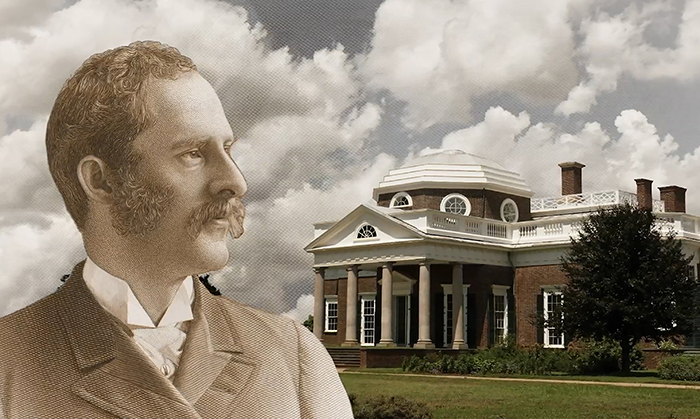
Charleston Jewish Filmfest Presents: “The Levys of Monticello” followed by a Zoom conversation with producer/director Steve Pressman
Arnold Hall 96 Wentworth Street, Charleston, SC, United StatesWhen Thomas Jefferson died in 1826, he left behind a mountain of personal debt, which forced his heirs to sell his beloved Monticello home and all of its possessions. The Levys of Monticello is a documentary film that tells the little-known story of the Levy family, which owned and carefully preserved Monticello for nearly a century – far longer than Jefferson or his descendants. The remarkable story of the Levy family also intersects with the rise of antisemitism that runs throughout the course of American history.
-
-
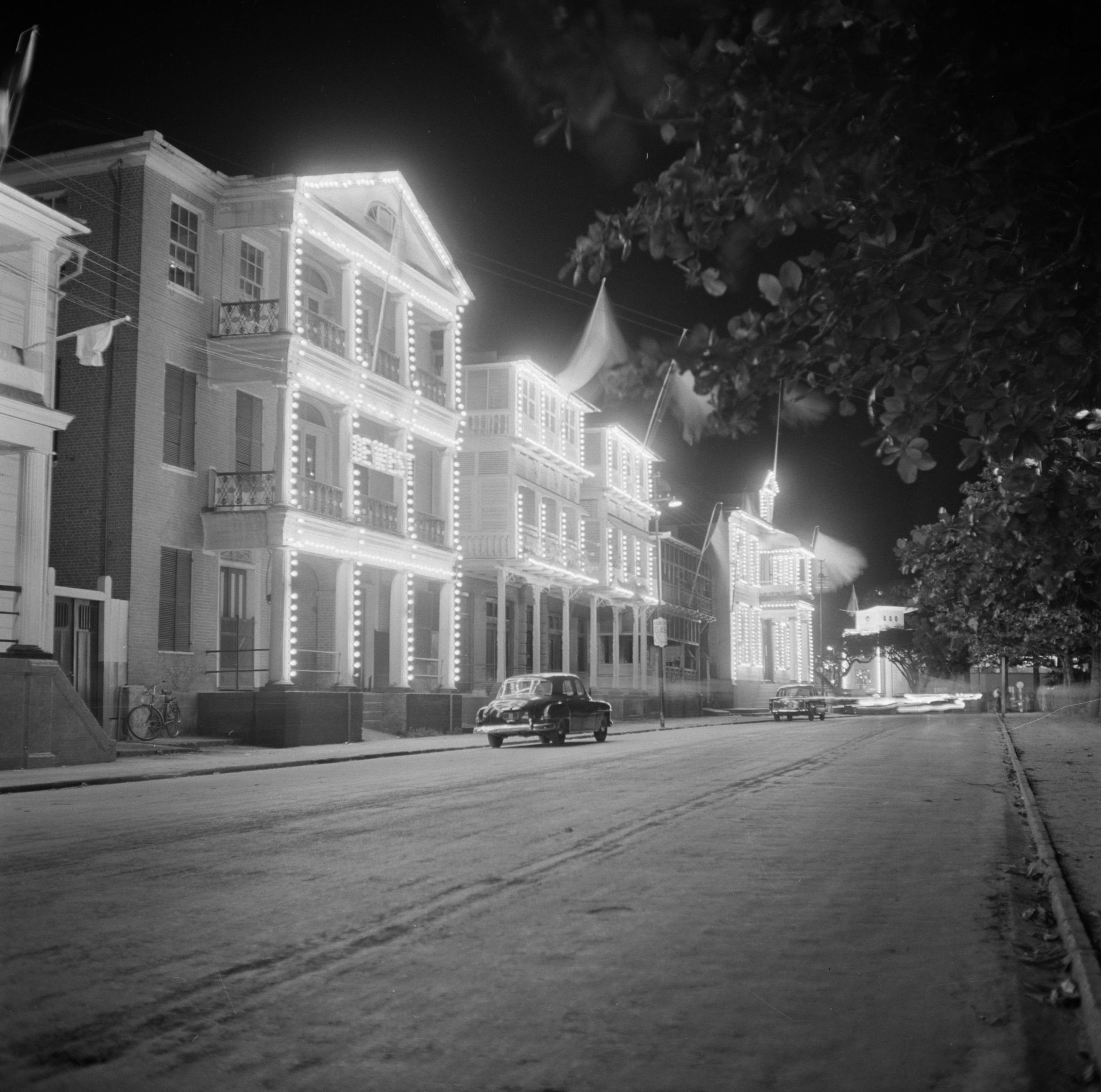
Creole Israel: Abraham Philip Samson and the Formation of the Caribbean Jewish Rootsman
Arnold Hall 96 Wentworth Street, Charleston, SC, United StatesProfessor Eli Rosenblatt will talk about the work of Abraham Philip Samson (1872-1958)—the relatively unknown Surinamese Jewish activist, writer, and pharmacist—as a lens on the complex position of Jews in late 19th and early 20th-century Suriname, a Caribbean country on the northeastern coast of South America ruled by the Netherlands until 1975. Since much excellent recent scholarship has focused on Surinamese Jewish culture in the era of slavery, this talk will discuss how Samson, a Surinamese Jewish descendant of both free Jews and enslaved people, inherited and represented the legacies of that era in political, ethical, and theological contexts.
-
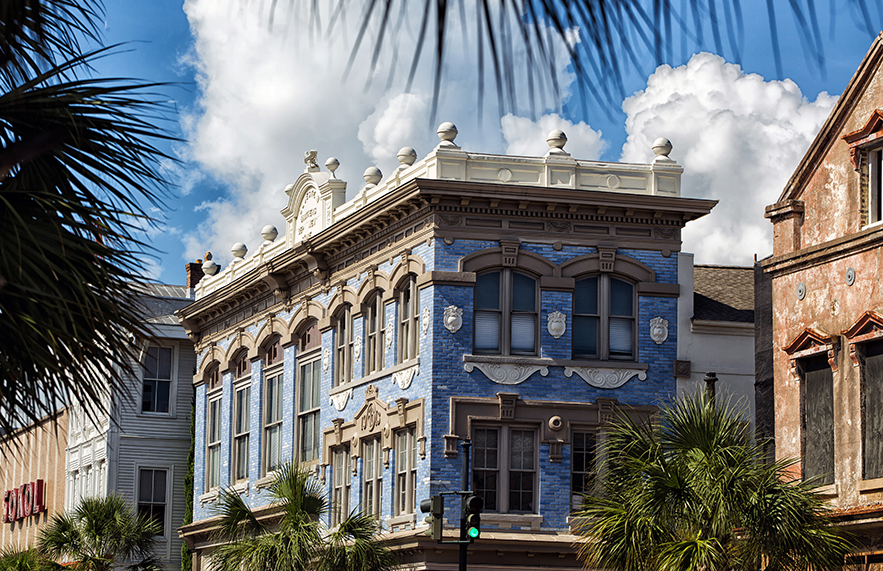
46th Annual Southern Jewish Historical Society Conference: Southern Jews and the Atlantic World
College of Charleston 175 Calhoun St, Charleston, South CarolinaPlanning is complete for the 46th annual SJHS conference, which [...]
-
-
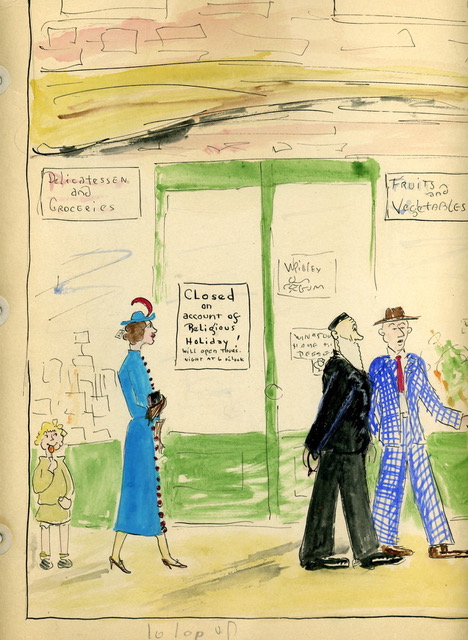
Private Lives/Public Archives: The Papers of Frances Mazo Butwin
Arnold Hall 96 Wentworth Street, Charleston, SC, United StatesDr. Joe Butwin studied English Literature at the University of Minnesota, taught History and Literature at Harvard and recently retired after 50 years of teaching English and Jewish Studies at the University of Washington in Seattle. The return of his mother’s papers to Charleston brings emotional satisfaction and at the same time requires reflection on the relation of privacy (letters, diaries!) and publicity and in this case, given his training, on the relation (once again) of History and Literature. He hopes that his example will encourage others to think through the process with or without a similar bundle of paper waiting in the attic.
This hybrid event will take place in the Jewish Studies Center, Arnold Hall (Room 100) and via Zoom. Brunch will be served beginning at 9:00 a.m. -
-

S.L Wisenberg’s The Wandering Womb Book Launch
Arnold Hall 96 Wentworth Street, Charleston, SC, United StatesEven as a fourth-generation Jewish Texan, S.L. Wisenberg always felt the ghost of Europe dogging her steps, making her feel uneasy in her body and in the world.
With wit, verve, blood, scars, and a solid dose of self-deprecation, Wisenberg wanders across the expanse of continents and combs through history books and family records in her search for home and meaning. Her travels take her from Selma, Alabama, where her Eastern European Jewish ancestors once settled, to Vienna, where she tours Freud's home and figures out what women really want, and she visits Auschwitz, which—disappointingly— leaves no emotional mark. The Wandering Womb: Essays in Search of Home will arrive in bookstores March 31, 2023. Her book won the 2022 Juniper Prize in nonfiction from University of Massachusetts Press.
Join us for a conversation with S.L. Wisenberg about her new book. This hybrid event will take place in the Jewish Studies Center, Arnold Hall (Room 100) and via Zoom. Brunch will be served beginning at 9:00 a.m.

